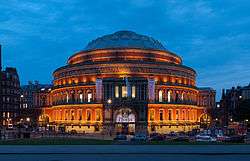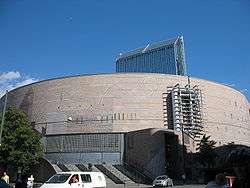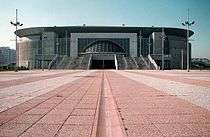History of the Eurovision Song Contest
The history of the Eurovision Song Contest began with an idea of Sergio Pugliese, of the Italian television RAI, and then approved by Marcel Bezençon of the European Broadcasting Union (EBU). The contest was based on the Italian Sanremo Music Festival and was designed to test the limits of live television broadcast technology.
The first contest took place on 24 May 1956,[1] where seven nations participated. As the Contest progressed, the rules grew increasingly complex and participation levels rose to pass forty nations at the end of the 20th century. As more countries came on board over subsequent decades and technology advanced, the EBU attempted to keep up with national and international trends.
The end of the Cold War in the early 1990s led to a sudden increase in numbers, with many former Eastern Bloc countries queuing up to compete for the first time. This process continued into the 2005 contest, in which both Bulgaria and Moldova made their debut.
Liechtenstein, Vatican City and Kosovo are the only European countries not to have participated; the most recent major European country to take part was the Czech Republic, which made its debut in the 2007 contest. San Marino took part in the 2008 Eurovision Song Contest in Belgrade, Serbia, together with Azerbaijan.
Australia made their debut in the 2015 contest and became the first country from the Oceania region (and the second country outside of Eurasia overall after Morocco in 1980) to participate in the contest. Although their participation was originally announced as a one-off event, the country was subsequently invited to participate in the 2016 contest.
Competition history







The songs
The earliest period in the Eurovision history is marked by the style of songs which participated and the manner in which the show itself was presented. Famous musical and film stars would participate without prejudice, with Italian winners of the Sanremo Festival and such British names as Patricia Bredin and Bryan Johnson. With a live orchestra the norm in the early years, and simple sing-a-long songs on every radio station, the Contest grew into a favourite amongst almost all age groups across the continent. Iconic songs such as "Volare" and Serge Gainsbourg's "Poupée de cire, poupée de son" hit the sales charts in many countries after their Eurovision performance.
In the beginning, it was obvious for the participants that they should sing in their country's national language. However, as the Swedish entry in 1965, "Absent Friend" was sung in English, the EBU set very strict rules on the language in which the songs could be performed. National languages had to be used in all lyrics, including Maltese when the island nation made its debut. Songwriters across Europe soon tagged onto the notion that success would only come if the judges could understand the content, resulting in such entries as "Boom-Bang-A-Bang" and "La La La". The lyrics were allowed to contain occasional phrases in other languages, which was utilized for example by the Yugoslavian song in 1969. In 1973, the rules on language use was relaxed, and in the following year ABBA would win with "Waterloo".
Those "freedom of language" rules would be soon reversed in 1977, to return with apparent permanent status in the 1999 contest, with the intervening years waning from highlights to dead-weight years. The "swinging sixties" and punk scenes were all but missed by the contemporary Eurovision periods, whilst the 1980s saw an increase in balladry with an almost blanket disregard for electronica or guitar-based pop. Other than heavily infused pop versions, rap has been next to completely ignored.
One result of the attempt to modernise the songs in the Contest was the abolition of the obligatory use of the live orchestra, to which all songs had to perform. This decision was made in 1997 and removed the automatic requirement for songs to be re-composed for playback with a live orchestra. As of 1999, the host country hasn't been obliged to provide a live orchestra, and there hasn't been one since. No attempt has been made to return the Contest to the days of live bands and violins. Live music is not allowed. This rule most likely exists because there isn't enough time to wire the instruments during the short break between the songs. On the other hand, a backing tape may have no voices on it, singing still must be done live. Before 1997 backing tracks were allowed, but only if all instruments on tape were featured on stage. This explains the odd situation in 1996, when Gina G, entrant for the United Kingdom, had two computer screens on stage.
Other than the earliest contests, each and every entry has been fixed at a maximum three minutes in length.
Competitors
Previous performers at the Eurovision Song Contest include:
- ABBA
- Anggun
- Amina Annabi
- Antique
- Apocalyptica (as an interlude act)
- Aqua (as an interlude act)
- Arash
- Soraya Arnelas
- Baccara
- Al Bano & Romina Power
- Dima Bilan
- Blue
- Goran Bregović (as an interlude act)
- Boyzone (as an interlude act)
- Brotherhood of Man
- Carola
- Cascada
- Cirque du Soleil (as an interlude act)
- Gigliola Cinquetti
- David Civera
- Mélanie Cohl
- Zdravko Čolić
- Toto Cutugno
- Mihai Trăistariu
- Sergio Dalma
- Dana International
- Anne-Marie David
- Céline Dion
- Kenan Doğulu
- DJ BoBo
- Dschinghis Khan
- Sertab Erener
- Lara Fabian
- Gina G
- Edyta Górniak
- Karel Gott
- Hadise
- Mary Hopkin
- Engelbert Humperdinck
- Fuerzabruta (as an interlude act)
- Hothouse Flowers (as an interlude act)
- Julio Iglesias
- Jedward
- Željko Joksimović
- Anna Maria Jopek
- Udo Jürgens
- Kalomira
- Patricia Kaas
- Paula Seling
- Ovi
- Katrina and the Waves
- Las Ketchup
- Luminița Anghel
- Vicky Leandros
- Johnny Logan
- Rosa López
- Ani Lorak
- Lordi
- Lulu
- Shiri Maimon
- maNga
- Marco Mengoni
- Jessica Mauboy (as an interlude act)
- Dino Merlin
- Lena Meyer-Landrut
- Mocedades
- Domenico Modugno
- Azucar Moreno
- Nana Mouskouri
- Marie Myriam
- New Seekers
- Olivia Newton-John
- Noa
- No Angels
- Paul Oscar
- Olsen Brothers
- Anna Oxa
- Helena Paparizou
- Ajda Pekkan
- Charlotte Perrelli
- Evgeni Plushenko (as part of performance)
- Dulce Pontes
- Toše Proeski
- Alla Pugacheva
- Esma Redžepova
- Sir Cliff Richard
- Riverdance (as an interlude act)
- Sakis Rouvas
- Ruslana
- Kate Ryan
- Alexander Rybak
- Natasha St-Pier
- Sandie Shaw
- The Shadows
- Kseniya Simonova (as part of performance)
- Pastora Soler
- t.A.T.u.
- Teach-In
- Sébastien Tellier
- Justin Timberlake (as a interlude act)
- Bonnie Tyler
- Vanilla Ninja
- Anna Vissi
- Dita Von Teese (as part of performance)
- Conchita Wurst
See also
References
- ↑ "Eurovision – History". Eurovision. Retrieved 8 June 2011.
- ↑ 7 countries performed 2 songs each
External links
- History by Year
- Eurovision Song Contest: The Story
- Sing Your Heart Out, Europe: The Eurovision Song Contest